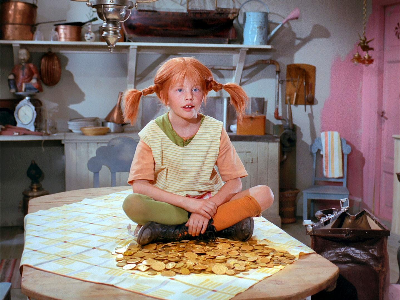
© https://www.aftenbladet.no
У 2025 році всесвітньо відома героїня дитячої літератури Пеппі Довгапанчоха відзначає 80-річчя. З моменту першого видання книги Астрід Ліндґрен у 1945 році, пригоди незвичайної дівчинки з рудими косичками були перекладені на 80 мов світу, включно з останнім – нігерійським піджином. Загалом продано понад 72 мільйони примірників. Пеппі, або повністю — Пеппілотта Віктуаліна Рутшгардіна Крістам’юнта Ефраїмівна Довгапанчоха, з першого дня свого літературного життя викликала неоднозначну реакцію. Вона мешкала без батьків у Віллі Курицька Ніжка, їла цукерки замість обідів і піднімала коня голими руками — все це збурило уяву не лише дітей, а й викликало критику з боку дорослих. Деякі літературні критики 1940-х років вважали Пеппі поганим прикладом для дітей, а саму Астрід Ліндґрен — несерйозною авторкою. Проте час розставив усе на свої місця. Сьогодні Пеппі вважається класикою світової дитячої літератури та символом незалежності, сили й уяви. Її фраза: «Сильний має бути ще й добрим» стала популярною цитатою, яку часто згадують у політичних та етичних дискусіях. Попри її сміливість, волелюбність та винахідливість, самі діти рідко хочуть бути схожими на Пеппі. Як показали опитування, школярі частіше обирають її друзів — Томмі або Анніку, бажаючи мати Пеппі не як приклад для наслідування, а як веселу подругу. Можливо, причина в тому, що за свободою Пеппі ховається глибоке почуття самотності — вона росте без батьків, її дім повен пригод, але позбавлений родинного тепла. За десятиліття образ Пеппі змінювався. Після перегляду суспільних норм, з текстів прибрали застарілі слова та стереотипи. Але суть героїні лишилась незмінною — вона досі вчить дітей відстоювати власну думку, не боятися бути іншими та бачити світ крізь призму уяви. У рік 80-річного ювілею попит на книги про Пеппі знову зріс, а у 2026 році її історія оживе на сцені Det Norske Teatret в Осло. А тим часом діти в усьому світі — від Швеції до Африки — продовжують знайомитися з дівчинкою, яка навчила нас, що сила не завжди про м’язи, і що бути не схожим на інших — не вада, а дар.
80 Years with Pippi Longstocking: The Eternal Childhood Heroine Who Continues to Conquer the World
In 2025, the world-famous heroine of children’s literature, Pippi Longstocking, celebrates her 80th anniversary. Since Astrid Lindgren’s book was first published in 1945, the adventures of the extraordinary red-haired girl have been translated into 80 languages worldwide, including the latest — Nigerian Pidgin. Over 72 million copies have been sold in total. Pippi, or fully — Pippilotta Viktualia Rullgardina Krusmynta Efraimsdotter Longstocking, sparked mixed reactions from the very first day of her literary life. She lived without parents in Villa Villekulla, ate candy instead of meals, and lifted a horse with her bare hands — all of which stirred the imagination not only of children but also drew criticism from adults. Some literary critics in the 1940s considered Pippi a bad example for children and regarded Astrid Lindgren as an unserious author. However, time has set everything in its place. Today, Pippi is considered a classic of world children’s literature and a symbol of independence, strength, and imagination. Her phrase, “Strong is also kind,” has become a popular quote often referenced in political and ethical discussions. Despite her bravery, freedom-loving nature, and inventiveness, children themselves rarely want to be like Pippi. Surveys show that schoolchildren more often choose her friends — Tommy or Annika — wishing to have Pippi not as a role model, but as a fun companion. Perhaps this is because behind Pippi’s freedom lies a deep sense of loneliness — she grows up without parents, her home is full of adventures but lacks family warmth. Over the decades, Pippi’s image has evolved. After reconsidering social norms, outdated words and stereotypes were removed from the texts. But the essence of the heroine remains unchanged — she still teaches children to stand up for their own opinions, not to fear being different, and to see the world through the prism of imagination. In the year of her 80th anniversary, demand for books about Pippi has risen again, and in 2026, her story will come to life on the stage of Det Norske Teatret in Oslo. Meanwhile, children all over the world — from Sweden to Africa — continue to discover the girl who taught us that strength is not always about muscles and that being different is not a flaw but a gift.
Support the publication or distribution of this article (specify): VISA corporate card number 4874 24 25 0032 3434
1847